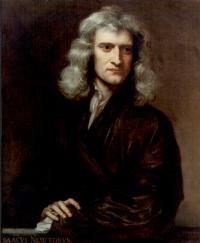Isaac Newton
 Isaac Newton was born into very meager means on December 25, 1642. His family were
farmers in east central England. As a young student, Newton was not a stellar student.
He was more interested in applying himself outside of the classroom. He made a windmill
that ground up grain and he constructed a clock that ran on water. By the request of his
uncle, Newton was encouraged to achieve a higher education and in 1661 attended Cambridge
University’s Trinity College, studying law. He was able to study some science and
mathematics and studied under the guidance of Galileo and Wallis (Porter, 1988)
Isaac Newton was born into very meager means on December 25, 1642. His family were
farmers in east central England. As a young student, Newton was not a stellar student.
He was more interested in applying himself outside of the classroom. He made a windmill
that ground up grain and he constructed a clock that ran on water. By the request of his
uncle, Newton was encouraged to achieve a higher education and in 1661 attended Cambridge
University’s Trinity College, studying law. He was able to study some science and
mathematics and studied under the guidance of Galileo and Wallis (Porter, 1988)
During the summer of 1665, Newton developed his theories on motion and gravitation,
components of white light, and calculus. Around the same time, Gottfried Leibniz
also discovered calculus. Thanks to their contributions, other scientists and
mathematicians could make more advanced discoveries to advance the fields.
Newton became a member of the British Parliament, and later president, of the
mathematical organization the Royal Society. His contributions to science and
mathematics ended upon his death on March 31, 1727 in London (Porter, 1988).

